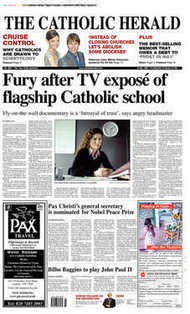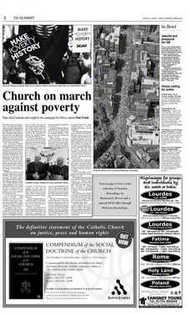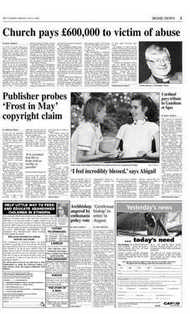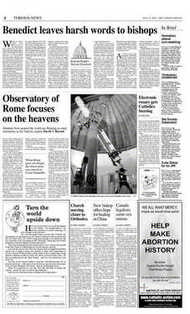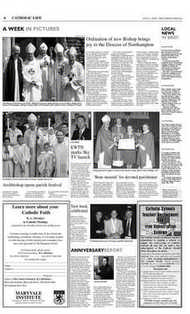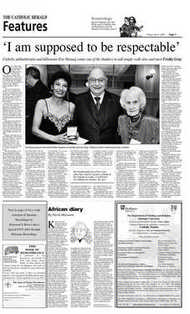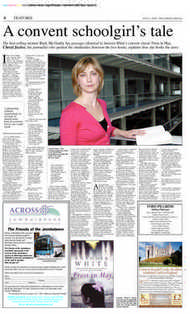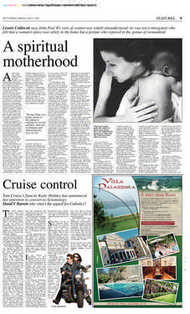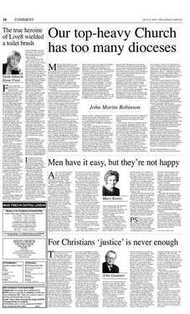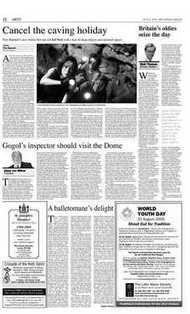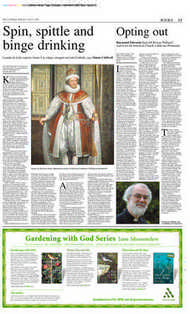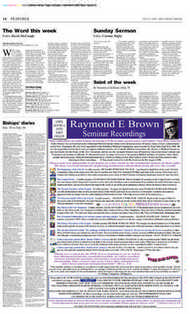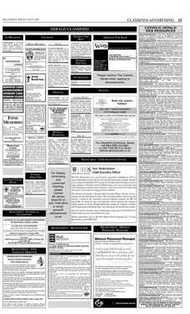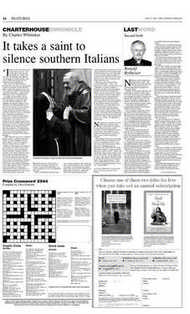Page 7, 8th July 2005
Page 7

Report an error
Noticed an error on this page?If you've noticed an error in this article please click here to report it.
Tags
Share
Related articles
Mrs Blair Supports Sailing Charity
Meeting Mr Norfolk Punch
A Catholic Charity Dinner At The Ritz
Popebenedictxvi From Feared Doctrinal Enforcer To A Pope...
An Original For Dorian Gray'
‘I am supposed to be respectable’
Catholic philanthropist and billionaire Eric Hotung comes out of the shadows to talk tough, walk slow and meet Freddy Gray One could easily pass through life unaware that people such as Eric Hotung exist. He is a strange and wonderful man, who merits international recognition for his philanthropic and diplomatic work. But he prefers to remain in the shadows, improving the world in secret.
“You can’t be effective unless you’re anonymous,” he says, his American accent deepening. “Otherwise people want to get in on the act and disrupt what you’re doing. You have to move in the corridors.” He looks towards the corridor of his large, elegant apartment in London’s Savoy Hotel and smiles. He has a slightly mischievous expression. His old eyes are sore, but they still sparkle of the Orient; his Chinese ancestry twinkling behind round spectacles.
Like many wise old men, Eric Hotung,79, enjoys a smoke. He puts a Kent cigarette in his mouth and calls for his Chinese batman, So, who appears from nowhere with a lighter and then vanishes.
Hotung sucks heavily on the white filter, tilts his head back and exhales. “I used to drink too much too,” he remembers fondly. “Too many Martinis, too many vodkas. I now can only take six vodkas straight, no more.” After the puffing is over, So re-materialises to put medicinal drops in his master’s smarting eyes. Hotung blinks a few times then grins to signal that the interview can now begin. He is ready to reminisce.
Eric Hotung, CBE, is an eccentric. When he met Bill Clinton, White House aides had warned the President that the oriental-looking billionaire was “a bit off-the-wall”.
Hotung’s conversation style is a little odd. His thoughts jump around confusingly. But he always makes his point, and remains a great raconteur, with enough swashbuckling experiences to rival Errol Flynn.
Indeed, there are so many fascinating aspects to Eric Hotung’s long life that it is hard to know where to begin.
The first part seems to have been rather wild: he was an amateur boxer, binge drinker and “petty larcenist”.
He is particularly proud of his days as a pugilist. “From the age 12 to 25, I never lost a fight and I had quite a few,” he remembers. “I was very aggressive. I had nine knockouts, three in the first round.” He also had a brief career as a thief during the Second World War in Japanese-occupied Shanghai. “I would call it ‘liberating enemy property’, but others might say it was just plain old burglary. I suppose we should call it petty larceny, I am supposed to be respectable these days you know.” Young Eric used to sneak out after the midnight curfew and steal from the enemy. “We took radiators, door handles, anything metallic,” he remembers. “It was very dangerous, if you were caught you were beaten or tortured. The ringleaders, such as me, were beheaded.” Eric Hotung inherited a large fortune aged 31. The family’s wealth was founded on the success of his grandfather, Sir Robert Hotung (1862-1956), an influential merchant in Hong Kong and China. His son Edward Hotung (1902-1957) – Eric’s father – was a prominent banker, who founded the Chinese Gold and Silver exchange in Hong Kong.
Young Eric seemed intent on blowing his inheritance. He fell into considerable debt during the 1960s. But he soon recovered, setting up a property empire across China, and transforming himself into a hard-nosed tycoon, The most striking part of Eric Hotung’s personality today is his ability to be a ruthless billionaire (his fortune is estimated at more than £70 million) and gentle do-gooder at the same time.
He can certainly play tough. Last month, he told the Sunday Telegraph that he had decided to disinherit two of his sons because they tried to win a chunk of his enormous fortune in court. “They took a gamble,” he said. “I would have left them a good inheritance but they gambled on getting it sooner... it doesn’t sadden me. I am through with them. I will leave my billions to charity.” He clearly separates the two sides to his nature. “A businessman is out to make every last buck he can,” he reflects. “There are rules in the world of business: fair play, honesty and integrity, but it’s unforgiving.
“The philanthropist side is different. If you come across a chronic drinker or a gambler, you can’t deny him help because he is a louse. You’ve got to do what the Bible tells you to do – be forgiving. What God says is that ‘Whatever you do unto the poorest of mine, you do unto me.’” Catholic faith enables Eric Hotung to combine an acute business brain with his charitable instincts.
“Without my belief in God I would be pretty much a hedonist,” he admits. His mother, Mordia O’Shea, a devout believer, instilled in her children the importance of giving. “She was a very generous woman. Even when things were tight, which they were for a while, she never refused anyone anything.” Both Sir Robert and Edward Hotung were also renowned for their philanthropy. Eric has not let down the family tradition. Six months ago, he donated $2 million (£1.1 million to the victims of the tsunami).
In 2000 he bought a boat to sail 12,000 refugees from West Timor to East Timor. He has also made large financial contributions to countless other charities and universities.
But Eric Hotung does not simply write cheques. He prefers to go to the scene or root of the problem.
Once, when walking down a street in Bangkok, he felt a hand in his pocket. “I grabbed it. It was a very young boy, he looked about seven or eight. I dragged him to the police and they took him off. But I followed up the case, and it turned out that he was not actually that young – he was already about 14. But he had taken so many drugs that he was a stunted growth of a human being. I got quite upset about that, thinking about the swines who did this.” He promptly set about sponsoring a string of drug rehabilitation projects.
Yet Eric Hotung’s greatest achievement has been to provide housing for the poor. “When I was in Shanghai, we used to pick up two to three hundred people every night, frozen because they did not have a home. So I built 2,000 apartments, which were made available to the lower-middle class for as little as 10 dollars a month, which is cheaper than any rent.” He has made impressive strides in the field of international relations, establishing important links between Britain, China and the United States. In 1988 he sponsored a symposium in Washington to discuss American trade policies towards China. In 1991, at the request of the Chinese authorities, he established the Hotung institute in Beijing as a centre for dialogue between China and other nations.
He also serves the Church in his diplomatic efforts, and has worked tirelessly to reconcile China with the Holy See. He organised the groundbreaking visit of the Archbishop of Manila, Cardinal Jaime Sin, who died late last month, to China, as well as the release of Catholic bishop Ignatius Kung, who had spent decades in prison and under house arrest.
Hotung is reluctant to discuss his negotiations with Chinese authorities. “They pulled strings at their end and we pulled strings at ours,” he says furtively.
He does say, however, that he is “cautiously optimistic” about the future of the Church in China.
“I have learnt to be patient about this,” he adds. “A reconciliation between China and the Vatican will only take place if the Pope meets the Chinese head of state.” As I leave the apartment after our interview, Eric Hotung says something to me in Mandarin. I look baffled. “It’s a Chinese expression,” he explains. “It means ‘walk slowly’.” I will. Eric Hotung has given me plenty to think about.
blog comments powered by Disqus


